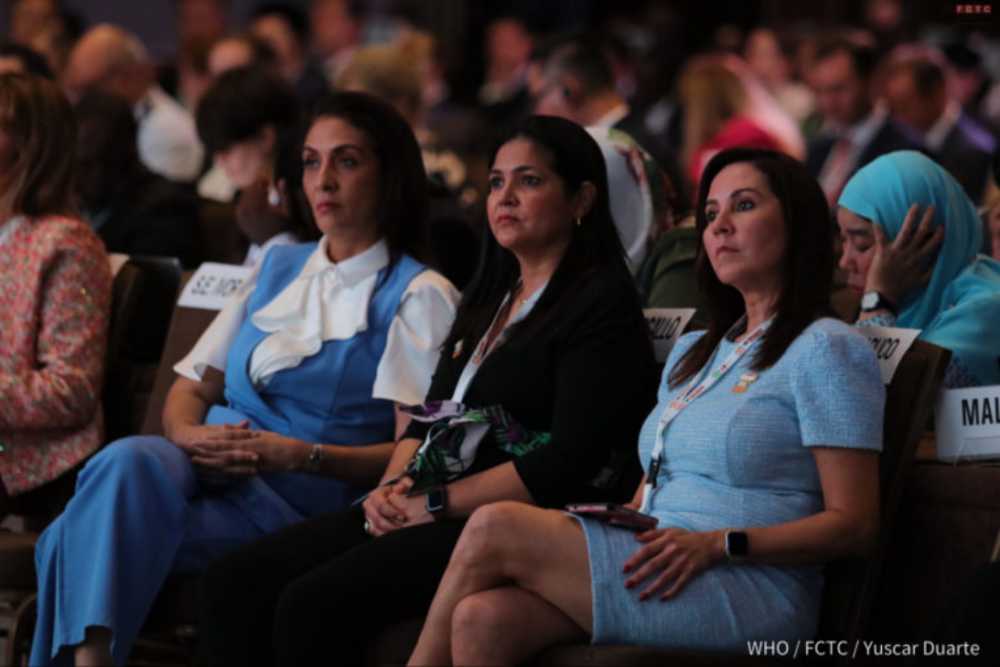The 10th Conference of the Parties to the World Health Organization Framework Convention on Tobacco Control (COP10-WHO FCTC) convened from Feb. 5 to 10 in Panama. This marks a significant moment in the global fight against tobacco use.
Amidst discussions and deliberations, the government, through Senior Deputy Executive Secretary Hubert Dominic Guevara, articulated its commitment to intensify efforts in combating this public health challenge. Here are the key takeaways from the conference:
Acknowledging Progress and Challenges
Patricia Kayle Martin represents Senior Deputy Executive Secretary Hubert Dominic Guevara during the conference. She extended the Philippines’ appreciation for the progress achieved by member parties in addressing tobacco use. However, she also acknowledged the persisting challenges that demand collective action and innovative solutions. These challenges include the continuous evolution of the tobacco industry’s tactics to attract new users, particularly among youth, and the prevalence of illicit trade in tobacco products.
Notable Progress in Implementation
Guevara highlighted the Philippines’ strides in implementing the WHO FCTC. He cited data from the Philippine Global Adult Tobacco Survey (GATS) indicating a decline in tobacco use from 23.8 per cent in 2015 to 19.5 per cent in 2021. This achievement reflects the effectiveness of a comprehensive approach driven by collaborative efforts across sectors. Furthermore, the Philippines has made significant advancements in tobacco control. This is seen explicitly through enforcing smoke-free policies in public spaces and implementing graphic health warnings on tobacco product packaging.
Legislative Measures and Regulatory Frameworks
Emphasising the importance of legislative support, Guevara underscored the enactment of Republic Act (RA) 11900. RA 11900 regulates vaporised nicotine and non-nicotine products. This legislation safeguards public health, particularly among minors, by restricting product sales and marketing activities. It is complemented by existing laws like the Tobacco Regulation Act of 2003 and the Graphic Health Warning Law. Additionally, the government has intensified efforts to regulate emerging tobacco products, such as electronic cigarettes. This addresses potential health risks and prevents their proliferation among vulnerable populations.
Utilisation of Excise Taxes
Guevara highlighted the significant contribution of excise taxes on tobacco and vapour products, amounting to USD 3 billion in 2022. These funds were allocated to vital government services, including universal healthcare COVID-19 recovery initiatives and infrastructure projects essential for national development. Implementing higher excise taxes on tobacco products aligns with international best practices. It is also an effective strategy to reduce tobacco consumption, especially among low-income populations.
Continued Efforts for Tobacco Control
In line with FCTC Article 6, the Philippines has consistently raised excise tax rates on tobacco products. This was executed by aligning with global efforts to reduce tobacco consumption by making cigarettes less affordable. Additionally, the government is actively pursuing legislation such as the Anti-Agricultural Economic Sabotage Act. It is aimed at combatting the illicit tobacco trade and protecting local industries. Moreover, the Philippines is committed to strengthening enforcement mechanisms and enhancing collaboration with law enforcement agencies. This intends to curb the smuggling and illicit distribution of tobacco products. The country also emphasises the importance of comprehensive tobacco control programs. These include public awareness campaigns, smoking cessation support, and youth prevention initiatives.
Commitment to Collaboration and Dialogue
Guevara reiterated the Philippines’ commitment to constructive engagement and knowledge-sharing with fellow conference parties. By fostering dialogue and collaboration, the country aims to overcome existing challenges and advance the objectives of the WHO FCTC. The Philippines actively participates in regional and international forums to exchange best practices, share experiences, and learn from successful tobacco control initiatives implemented by other countries. Through these collaborative efforts, the Philippines seeks to leverage global expertise and resources to accelerate progress towards a tobacco-free future.
Conclusion
As the COP10-WHO FCTC draws close, the Philippines reaffirms its dedication to the global fight against tobacco use. Through legislative initiatives, regulatory frameworks, and strategic utilisation of resources, the government aims to reduce tobacco consumption further and promote public health for all citizens. By embracing collaboration and innovation, the Philippines stands poised to make significant strides in realising the objectives of the WHO FCTC and building a healthier, tobacco-free future for generations to come.
Photo credit: WHO

